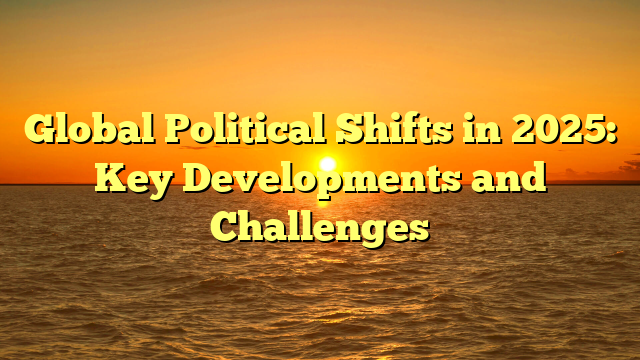
As 2025 unfolds, global politics continues to evolve, with major elections, geopolitical tensions, and policy shifts shaping the future of nations. From the U.S. presidential race to diplomatic conflicts in Europe and Asia, political decisions made this year will have long-lasting effects on international relations, economic stability, and security. This article explores some of the most significant political developments of 2025 and their potential impact on the world.
U.S. Presidential Election: A Pivotal Moment
One of the most closely watched events of 2025 is the U.S. presidential election. With economic concerns, social policies, and foreign relations at the forefront of the political debate, American voters are facing a crucial decision about the country’s future direction.
The election sees a tight race between major party candidates, with key issues including:
Economic Stability – Inflation, job growth, and tax policies remain central topics as candidates propose different strategies to boost the economy.
Healthcare and Social Policies – Debates over healthcare affordability, immigration laws, and education reform are shaping voter preferences.
Foreign Policy – Relations with China, Russia, and NATO allies are major discussion points, particularly concerning military strategies and trade agreements.
Voter turnout is expected to play a significant role in determining the election outcome, as younger generations and independent voters become increasingly influential.
Europe’s Political Shifts and Economic Challenges
Across Europe, governments are dealing with rising nationalism, economic recovery efforts, and security concerns. Several nations, including France, Germany, and Italy, are experiencing leadership changes, bringing new political strategies to the table.
ovjtoto daftar in Europe:
Nationalism vs. EU Unity – Some political parties are advocating for stronger national control over immigration and trade, challenging European Union (EU) policies.
Energy Crisis and Climate Policies – Europe continues to focus on renewable energy while reducing dependency on Russian gas and oil.
Security and Defense – Military cooperation between EU nations is increasing due to rising tensions in Eastern Europe.
The EU faces ongoing discussions about expansion, economic recovery post-pandemic, and technological regulations that will define its role in global affairs.
The U.S.-China Rivalry: Trade and Military Tensions
The relationship between the United States and China remains a major geopolitical concern. Trade disputes, technological competition, and military activities in the Indo-Pacific region have intensified tensions between the two superpowers.
Key Areas of Conflict:
Trade Wars – Both nations continue to impose tariffs and restrictions on technology exports, affecting global supply chains.
Taiwan Crisis – China’s increasing military presence near Taiwan has led to heightened tensions, with the U.S. reaffirming its support for Taiwan’s sovereignty.
Artificial Intelligence and Cybersecurity – The race for technological dominance has sparked concerns about data security and AI advancements.
Despite these conflicts, diplomatic talks continue, as both countries recognize the need for economic cooperation in global markets.
Middle East: Evolving Alliances and Regional Conflicts
The Middle East remains a politically dynamic region, with new alliances forming and long-standing conflicts continuing to challenge stability.
Major Political Developments:
Iran Nuclear Deal – Negotiations are ongoing as Western nations seek to prevent Iran from developing nuclear weapons while easing economic sanctions.
Saudi Arabia and UAE’s Economic Expansion – These nations are investing heavily in infrastructure, technology, and tourism to diversify their economies beyond oil.
Israeli-Palestinian Relations – Tensions persist despite diplomatic efforts, with both sides facing pressure from the international community to negotiate peace.
The region’s future largely depends on diplomatic resolutions, economic reforms, and security partnerships with global powers.
The Role of Climate Policy in Global Politics
Climate change remains one of the most pressing global issues, influencing political decisions and international agreements. Governments worldwide are implementing policies to reduce carbon emissions, invest in renewable energy, and address the impacts of extreme weather events.
Global Climate Initiatives:
Carbon Neutrality Goals – Many nations are committing to net-zero emissions by 2050, with significant investments in green energy.
Sustainable Development Agreements – International organizations are pushing for stricter environmental regulations and funding for developing countries.
Private Sector Involvement – Companies are increasingly adopting eco-friendly practices, supported by government incentives and consumer demand.
While progress is being made, political disagreements over funding and implementation strategies continue to delay effective global action.
Conclusion
The political landscape of 2025 is defined by elections, geopolitical rivalries, economic challenges, and environmental policies. As world leaders make critical decisions, the future of international relations and global stability hangs in the balance. With tensions rising in multiple regions and rapid technological advancements reshaping economies, diplomacy and cooperation will be crucial in determining the path forward.





